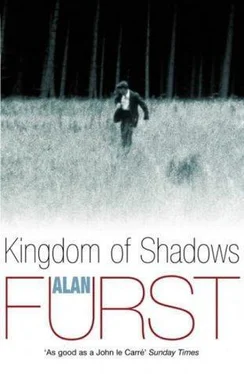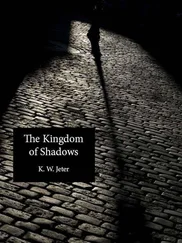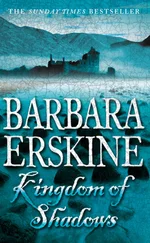Alan Furst - Kingdom of Shadows
Здесь есть возможность читать онлайн «Alan Furst - Kingdom of Shadows» весь текст электронной книги совершенно бесплатно (целиком полную версию без сокращений). В некоторых случаях можно слушать аудио, скачать через торрент в формате fb2 и присутствует краткое содержание. Жанр: Шпионский детектив, на английском языке. Описание произведения, (предисловие) а так же отзывы посетителей доступны на портале библиотеки ЛибКат.
- Название:Kingdom of Shadows
- Автор:
- Жанр:
- Год:неизвестен
- ISBN:нет данных
- Рейтинг книги:5 / 5. Голосов: 1
-
Избранное:Добавить в избранное
- Отзывы:
-
Ваша оценка:
- 100
- 1
- 2
- 3
- 4
- 5
Kingdom of Shadows: краткое содержание, описание и аннотация
Предлагаем к чтению аннотацию, описание, краткое содержание или предисловие (зависит от того, что написал сам автор книги «Kingdom of Shadows»). Если вы не нашли необходимую информацию о книге — напишите в комментариях, мы постараемся отыскать её.
Kingdom of Shadows — читать онлайн бесплатно полную книгу (весь текст) целиком
Ниже представлен текст книги, разбитый по страницам. Система сохранения места последней прочитанной страницы, позволяет с удобством читать онлайн бесплатно книгу «Kingdom of Shadows», без необходимости каждый раз заново искать на чём Вы остановились. Поставьте закладку, и сможете в любой момент перейти на страницу, на которой закончили чтение.
Интервал:
Закладка:
The baroness held court in an ironwork garden chair, scolding the vizslas as they agitated for forbidden morsels from the guests and beckoning her friends to her side. Seated next to her was an American woman called Blanche. She was the wife of the cellist Kolovitzky, a vivid blonde with black eyebrows, tanned skin from a life spent by Hollywood pools, and an imposing bosom on a body that should have been Rubenesque but was forced to live on grapefruit and toast.
“Darling Nicholas,” the baroness called out to him. “Come and talk to us.”
As he headed toward her, he saw Bolthos in the crowd and acknowledged his glance with a friendly nod. He was, for a moment, tempted to say something of his suspicions but immediately thought better of it. Silence, he told himself.
Morath kissed Lillian Frei on both cheeks. “Nicholas, have you met Blanche? Bela’s wife?”
“That’s Kolovitzky, not Lugosi,” the woman said with a laugh.
Morath laughed politely along with her as he took her hand. Why was this funny?
“At the Christmas party,” Morath said. “Is good to see you again.”
“She was at the Crillon,” Baroness Frei said. “But I made her come and stay with me.”
Kolovitzky’s wife started to talk to Morath in English, while Morath tried to follow along as best he could. The baroness saw that he was lost and began to translate into Hungarian, holding Blanche’s right hand tightly in her left and moving both hands up and down for emphasis as the conversation continued.
This was, Morath saw right away, a bad, potentially fatal, case of money madness. On the death of an aunt in Johannesburg, the cellist who scored Hollywood films had inherited two apartment houses in Vienna. “Nothing fancy, you know, but solid. Respectable.”
Kolovitzky’s friends, his lawyer, and his wife had all laughed at the absurdity of Kolovitzky going back to Austria to claim the inheritance. Kolovitzky laughed right along with them, then flew to Paris and took a train to Vienna.
“He was poor as a child,” Blanche said. “So money is never enough for him. He goes around the house and turns off the lights.”
She paused, found a handkerchief in her purse, and dabbed at her eyes. “Excuse me,” she said. “He went to Vienna three weeks ago, he’s still there. They won’t let him out.”
“Did someone encourage him to come?”
“See? He knows,” Blanche said to the baroness. “A scoundrel, a lawyer in Vienna. ‘Don’t worry about a thing,’ he said in his letter. ‘You’re an American, it won’t be a problem.’ “
“He’s a citizen?”
“He’s got papers as a resident alien. I had a letter from him, at the Crillon, and the story was that once he gave them the buildings-that lawyer’s in cahoots with the Nazis, that’s what’s going on-he thought they’d let him go home. But maybe it isn’t so simple.”
The baroness stopped dead on cahoots, and Blanche said, “I mean, they’re all in it together.”
“Did he go to the American embassy?”
“He tried. But they don’t interest themselves in Jews. Come back in July, they told him.”
“Where is he, in Vienna.”
She opened her purse and brought out a much-folded letter on thin paper. “He says here,” she hunted for her glasses and put them on, “says here, the Schoenhof. Why I don’t know-he was at the Graben, which he always liked.” She read further and said, “Here. He says, ‘I have put the buildings, for tax purposes, in Herr Kreml’s name.’ That’s the lawyer. ‘But they tell me that further payments may be required.’ Then he says, ‘I can only hope it will be acceptable, but please speak with Mr. R. L. Stevenson at the bank and see what can be done.’ That too is odd, because there is no Mr. Stevenson, not that I know about.”
“They won’t let him out,” the baroness said.
“May I have the letter?” Morath said.
Blanche handed it to him, and he put it in his pocket.
“Should I send money?”
Morath thought it over. “Write and ask him how much he needs and when he’ll be coming home. Then say that you’re annoyed, or show it, with how he’s always getting into trouble. Why can’t he learn to respect the rules? The point is, you’ll bribe, but the bribe has to work, and you’ll say later that it was all his fault. They’re sensitive about America, the Nazis, they don’t want stories in the newspapers.”
“Nicholas,” the baroness said. “Can anything be done?”
Morath nodded. “Maybe. Let me think it over.”
The baroness Frei looked up at him, eyes blue as the autumn sky.
Blanche started to thank him, and had already said too much and was about to mention money when the baroness intervened.
“He knows, darling, he knows,” she said gently. “He has a good heart, Count Nicholas.”
Seen from a private box in the grandstand, the lawns of Longchamps racetrack glowed like green velvet. The jockeys’ silks were bright in the sunshine, scarlet and gold and royal blue. Silvana tapped the end of a pencil against a racing form. “Coup de Tonnerre?” she said. Thunderbolt. “Was that the gray one with the long tail? Horst? Do you remember?”
“I think it was,” Von Schleben said, peering at the program. “Pierre Lavard is riding, and they let him win once a day.” He read further. “Or maybe Bal Masque. Who do you like, Morath?”
Silvana looked at him expectantly. She wore a print silk dress and pearls, her hair now expensively styled.
“Coup de Tonnerre,” Morath said. “He took a third place, the last time he ran. And the odds are attractive.”
Von Schleben handed Silvana a few hundred francs. “Take care of it for us, will you?” Morath also gave her money. “Let’s try Count Morath’s hunch.”
When she’d gone off to the betting windows, Von Schleben said, “Too bad about your uncle. We had good times together, but that’s life.”
“You didn’t hear anything, did you? After it happened?”
“No, no,” Von Schleben said. “Into thin air.”
As the horses were walked to the starting line, there were the usual difficulties, a starter’s assistant leaping out of the way to avoid being kicked.
“There’s a lawyer in Vienna I’d like to get in touch with,” Morath said. “Gerhard Kreml.”
“Kreml,” Von Schleben said. “I don’t think I know him. What is it that interests you?”
“Who he is. What kind of business he does. I think he has connections with the Austrian party.”
“I’ll see what I can do for you,” Von Schleben said. He handed Morath a card. “Call me, first part of next week, if you haven’t heard anything. Use the second number, there, on the bottom.”
The race began, the horses galloping in a tight pack. Von Schleben raised a pair of mother-of-pearl opera glasses to his eyes and followed the race. “Take the rail, idiot,” he said. The horses’ hooves drummed on the grass. At the halfway point, the jockeys began to use their whips. “Ach scheiss!” Von Schleben said, lowering the glasses.
“This Kreml,” Morath said. “He has a client in Vienna, a friend of a friend, who seems to be having tax problems. There’s a question of being allowed to leave the country.”
“A Jew?”
“Yes. A Hungarian musician, who lives in California.”
“If he pays the taxes there should be no problem. Of course, there are special situations. And if there are, irregularities, well, the Austrian tax authority can be infernally slow.”
“Shall I tell you who it is?”
“No, don’t bother. Let me find out first who you’re dealing with. Everything in Vienna is-a little more complicated.”
The winners of the race were announced. “Too bad,” Von Schleben said. “Maybe better luck next time.”
Читать дальшеИнтервал:
Закладка:
Похожие книги на «Kingdom of Shadows»
Представляем Вашему вниманию похожие книги на «Kingdom of Shadows» списком для выбора. Мы отобрали схожую по названию и смыслу литературу в надежде предоставить читателям больше вариантов отыскать новые, интересные, ещё непрочитанные произведения.
Обсуждение, отзывы о книге «Kingdom of Shadows» и просто собственные мнения читателей. Оставьте ваши комментарии, напишите, что Вы думаете о произведении, его смысле или главных героях. Укажите что конкретно понравилось, а что нет, и почему Вы так считаете.












